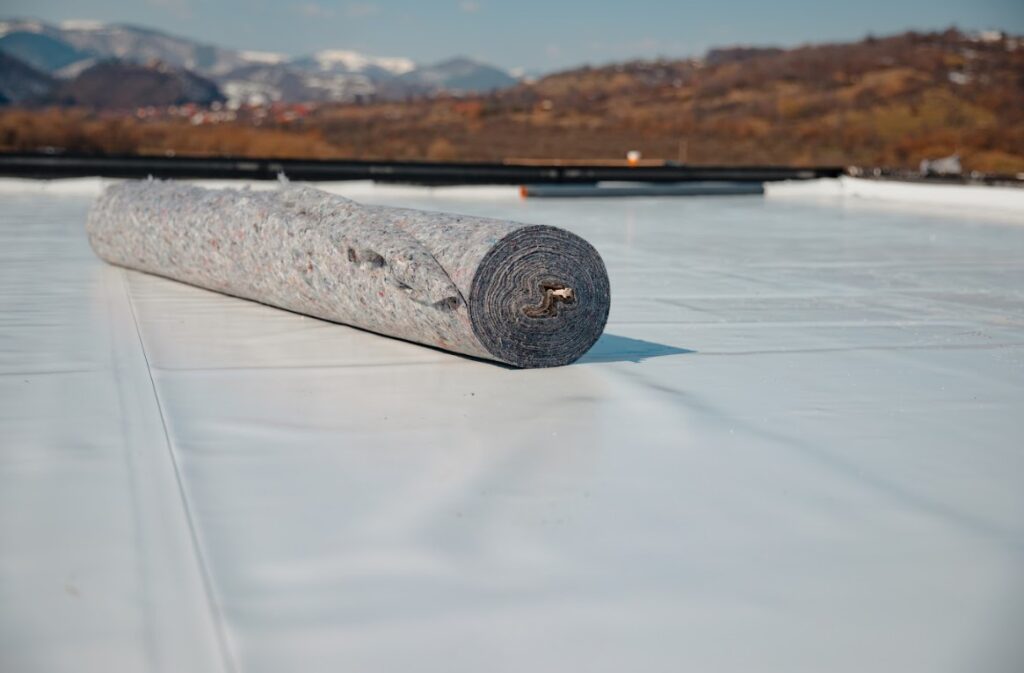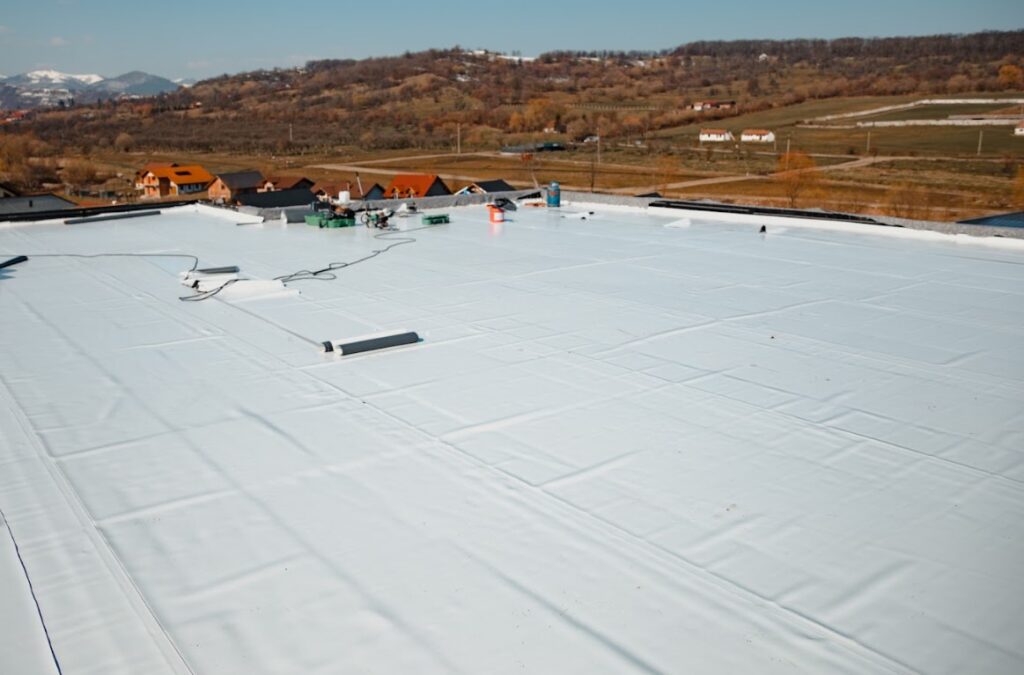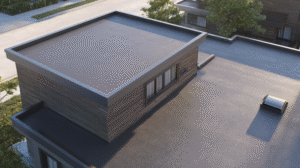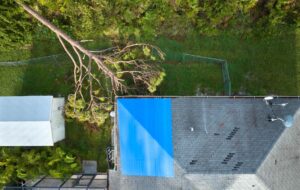Choosing the right commercial roofing system is a crucial decision for property managers, business owners, and facility supervisors. The roof not only protects your building and assets, but also plays a significant role in energy efficiency, maintenance costs, and long-term durability. With multiple commercial roof types available, understanding their differences is essential to making the right investment.
At Dover Roofing Contractors, we work with a wide range of roofing materials and systems. This guide will help you compare the most common commercial roof types, including TPO, EPDM, PVC, metal, and modified bitumen, so you can select the best solution for your specific building and climate.
Why Your Commercial Roof Type Matters
Not all commercial roofing systems are created equal. The ideal roof depends on several factors:
- Climate and regional weather (like snow and rain in Dover, NH)
- Roof slope and building structure
- Energy efficiency goals
- Maintenance needs and lifespan
- Budget and timeline
By understanding the key benefits and limitations of each material, you can make a choice that aligns with both your building’s requirements and your bottom line.
TPO (Thermoplastic Olefin) Roofing
TPO roofing is one of the fastest-growing commercial roofing systems in the U.S. It’s a single-ply membrane known for its energy efficiency and ease of installation.
Pros of TPO Roofing:
- Highly reflective, reduces cooling costs
- Resistant to UV rays, ozone, and chemical exposure
- Lightweight and easy to install
- Lower material cost than other membrane systems
Cons of TPO Roofing:
- Varies in quality depending on manufacturer
- Can shrink over time if not properly installed
- Seams may weaken with age or poor welding
Best For:
Flat or low-slope commercial roofs needing energy efficiency in warm or sunny climates.
EPDM (Ethylene Propylene Diene Monomer) Roofing
EPDM roofing is a durable rubber membrane widely used in commercial flat roofs for its flexibility and weather resistance.
Pros of EPDM Roofing:
- Excellent resistance to UV rays and ozone
- Long lifespan (up to 30 years)
- Can withstand extreme temperature swings
- Easy to repair and maintain
Cons of EPDM Roofing:
- Black EPDM absorbs heat unless coated
- Seams are glued (not heat-welded), which may loosen over time
- Less puncture-resistant than TPO or PVC
Best For:
Commercial buildings in colder climates or areas with high roof traffic.

PVC (Polyvinyl Chloride) Roofing
PVC roofing is a premium single-ply roofing system offering chemical resistance, strength, and long-term durability.
Pros of PVC Roofing:
- Heat-welded seams provide excellent waterproofing
- Superior chemical and grease resistance
- Long lifespan (20–30+ years)
- Reflective white surface enhances energy efficiency
Cons of PVC Roofing:
- Higher cost compared to TPO or EPDM
- Less flexible in extremely cold temperatures
- May shrink if improperly installed
Best For:
Restaurants, factories, or commercial spaces with chemical exposure or rooftop equipment.

Metal Roofing Systems
Metal roofs have long been a favorite in commercial and industrial applications for their unmatched lifespan and resistance to extreme weather.
Pros of Metal Roofing:
- Extremely durable (40–70 years lifespan)
- Resistant to fire, hail, wind, and snow
- Low maintenance once installed
- Can be installed over existing roofing systems
Cons of Metal Roofing:
- Higher upfront cost
- Requires skilled installation
- Noisy during heavy rain without proper insulation
Best For:
Industrial buildings, warehouses, and commercial facilities with steep-slope roofs.
For more on energy-efficient metal roofing benefits, see this Department of Energy resource on cool roofs.
Modified Bitumen Roofing
Modified bitumen is an asphalt-based roofing system reinforced with either polyester or fiberglass. It’s common in older or budget-conscious commercial buildings.
Pros of Modified Bitumen Roofing:
- Multi-layered durability
- Affordable material cost
- Resistant to foot traffic
- Easy to repair with patching
Cons of Modified Bitumen Roofing:
- Less energy-efficient without a reflective coating
- Installation involves open flames or hot asphalt
- Shorter lifespan than membrane systems (10–20 years)
Best For:
Commercial buildings with flat roofs and budget limitations.
Built-Up Roofing (BUR)
BUR systems, also known as “tar and gravel” roofs, have been used for over a century and involve multiple layers of bitumen and reinforcing fabric.
Pros of Built-Up Roofing:
- Extremely durable with multiple waterproofing layers
- Excellent UV resistance with gravel topcoat
- Fire resistant and affordable
Cons of Built-Up Roofing:
- Heavy weight may require structural reinforcement
- Lengthy installation time
- More maintenance than modern membrane systems
Best For:
Low-slope roofs on older buildings where traditional systems are still in use.
Comparison Chart of Commercial Roof Types
| Roofing Type | Lifespan | Energy Efficiency | Installation Cost | Best For |
| TPO | 15–25 years | High | Moderate | Reflective, cost-effective roofs |
| EPDM | 20–30 years | Moderate (black) | Low | Cold climates, long-term value |
| PVC | 20–30+ years | High | High | Chemical resistance, flat roofs |
| Metal | 40–70 years | High | High | Industrial buildings, durability |
| Modified Bitumen | 10–20 years | Low–Moderate | Low | Budget-focused flat roofs |
| BUR | 20–30 years | Moderate | Moderate | Older low-slope structures |
Key Factors to Consider Before Choosing a Roof Type
Roof Slope and Design
Flat roofs work best with TPO, EPDM, PVC, and BUR systems, while pitched commercial roofs may benefit more from metal roofing due to water runoff and installation technique.
Building Use and Exposure
Is your building a restaurant with rooftop grease vents? Or a chemical plant? You’ll need a roof like PVC that resists corrosion. Office buildings may benefit from cool TPO or EPDM systems to save on utilities.
Budget and Lifecycle Costs
Don’t just consider installation costs. Energy savings, maintenance, and the frequency of repairs also matter. Spending more upfront on a durable system like metal or PVC may save you more over 30 years.
Local Weather Conditions
In Dover, NH, roofs must stand up to snow loads, freeze-thaw cycles, and potential rainstorms. Waterproofing, insulation, and wind resistance should be part of your decision.
The National Institute of Building Sciences offers resources on climate-adapted roofing systems for commercial structures.
Working with a Trusted Commercial Roofing Partner
Choosing the right roofing material is only part of the equation. Proper installation is equally—if not more—important. That’s why working with an experienced commercial roofing contractor is key to a successful project.
A qualified roofer should:
- Understand your building’s specific needs
- Offer material comparisons tailored to your goals
- Provide a detailed quote with timelines and warranty info
- Be fully licensed, insured, and OSHA-compliant
At Dover Roofing Contractors, we specialize in helping property owners and managers choose and install the best commercial roof types for their business or facility. We consider every detail, from energy savings to long-term value.
Let’s Talk About Your Roof
Whether you need to replace a worn-out roof or install a new system for a facility expansion, choosing the right commercial roof type is the first step in a successful project.
Our team at Dover Roofing Contractors is here to help you compare materials, answer your questions, and develop a roofing plan that meets your business’s goals and budget.
Get a free estimate now and take the first step toward a more efficient, reliable, and cost-effective commercial roof in Dover, NH.



